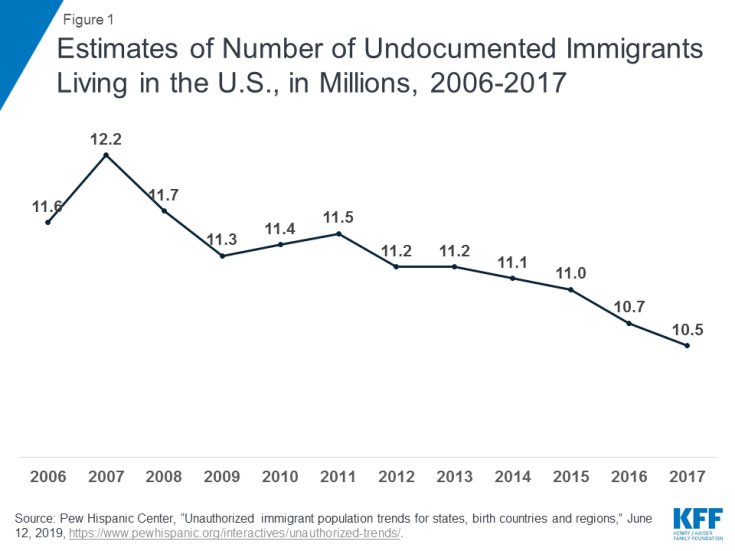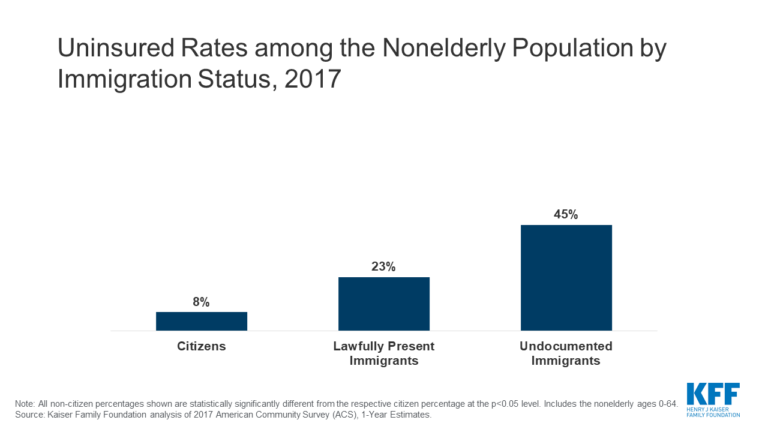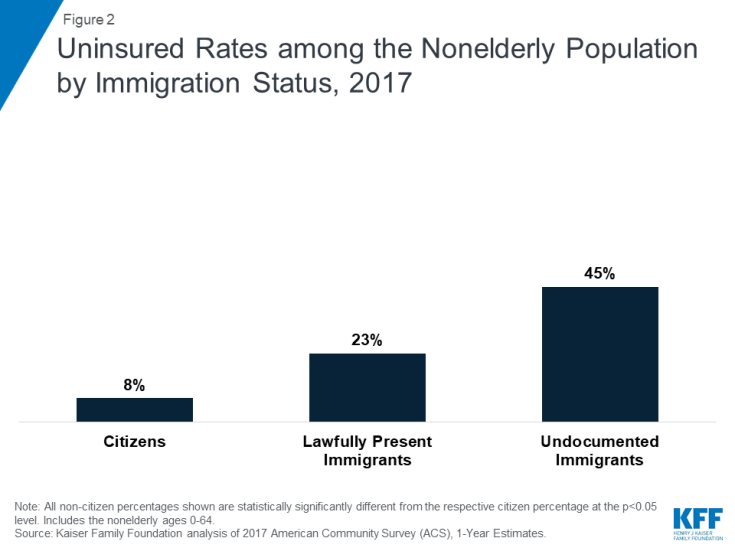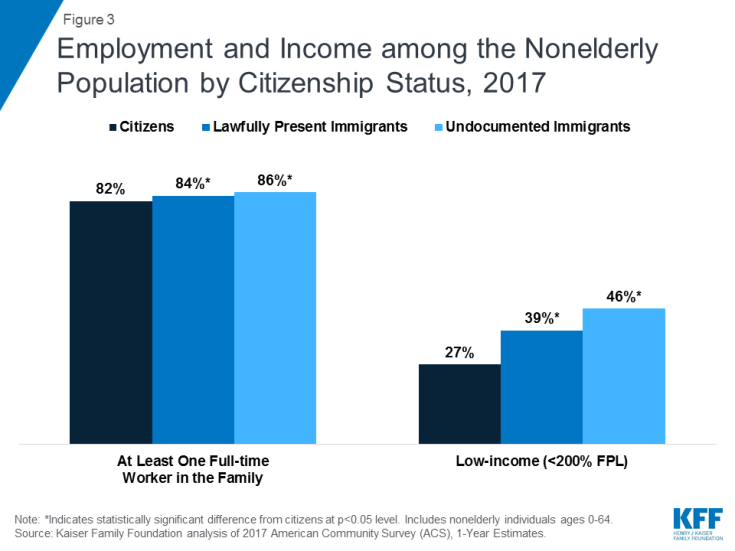Recently, many Democratic presidential candidates have expressed support for extending health coverage to undocumented immigrants. To help illuminate the implications of such an expansion, this brief provides an overview of current health coverage and care for undocumented immigrants. This shows:
|
Introduction
Recently, many Democratic presidential candidates have expressed support for extending health coverage to undocumented immigrants. To help illuminate the implications of such an expansion, this brief provides an overview of current health coverage and care for undocumented immigrants.
Undocumented immigrants are at high risk of being uninsured because they have limited access to coverage options. They face barriers to accessing care due to their high rates of uninsurance.
Overview of Undocumented Immigrants
Undocumented immigrants are people born abroad and residing in the United States without authorization. This group includes people who entered the country without authorization and people who entered the country legally and remained after their visa or status expired. The primary reasons individuals immigrate to the United States are for better job opportunities, to reunite with family, and for increased security. Undocumented immigrants make up about four in ten noncitizens, while the remaining six in ten are legally present immigrants. Many immigrant families include people with mixed immigration status, and the majority of children with a noncitizen parent are U.S.-born citizens.
It is estimated that there were 10.5 million undocumented immigrants residing in the United States in 2017, representing approximately 3% of the total United States population. Estimates from the Pew Hispanic Center show that the number of undocumented immigrants in the United States has been declining since 2007 (Figure 1). This decline largely reflects a sharp decline in the number of new undocumented immigrants. As a result, a growing share of undocumented immigrants are people who have lived in the United States for many years. In 2017, approximately two-thirds (66%) of undocumented adult immigrants in the United States had resided in the United States for more than 10 years, up from 41% in 2007.

Figure 1: Estimates of the number of undocumented immigrants living in the United States, in millions, 2006-2017
Health coverage for undocumented immigrants
Undocumented immigrants are at high risk of being uninsured. Among the total nonelderly population, 45 percent of undocumented immigrants were uninsured, compared to about one in four legally present immigrants (23 percent) and fewer than one in ten citizens (8 percent) in 2017 (Figure 2).. Although noncitizens are more likely to be uninsured than citizens, citizens still represent the majority of uninsured nonelderly people, since noncitizens represent only a small portion of the overall population.
The higher rate of uninsured among undocumented immigrants reflects limited access to health coverage options.
- Undocumented immigrants are not eligible to enroll in Medicare, Medicaid, or CHIP or purchase coverage through the ACA marketplaces. Under rules issued by the Centers for Medicare and Medicaid Services, individuals in Deferred Action for Childhood Arrivals (DACA) status are not considered legally present and remain ineligible for these coverage options. Since 2002, states have had the option to provide prenatal care to women regardless of immigration status by extending CHIP coverage to the unborn child. As of January 2019, 16 states have adopted this option.
- Although most nonelderly undocumented immigrants live in families with a full-time worker (Figure 3), they have limited access to employer-sponsored coverage. They often work in low-wage jobs and industries that are less likely to offer employer-sponsored coverage. Additionally, undocumented immigrants are more likely than other groups to have low incomes, making it difficult to access employer-sponsored coverage when it is available.
Current coverage among undocumented immigrants reflects a limited range of private coverage and some state or locally funded programs. Some undocumented immigrants may receive coverage through their employer or as the spouse or dependent of an employee. Undocumented immigrants can also purchase private coverage in the individual market outside of the ACA marketplaces, although many are unable to afford this coverage due to their limited income and lack of subsidies to offset the costs of this. blanket. Some undocumented immigrants may also be covered by student health programs. Six states (CA, IL, MA, NY, OR, and WA) and DC use state-only funds to cover income-eligible children regardless of immigration status. In June 2019, California approved an expansion of coverage for income-eligible undocumented immigrant young adults until age 25.
Health Care for Undocumented Immigrants
Given their higher rates of uninsurance, many undocumented immigrants delay their arrival or find themselves without necessary care. Research shows that having insurance makes a difference in whether and when people get the care they need. Those who are uninsured often delay receiving or go without the care they need, which can lead to worse long-term health outcomes and ultimately more complex and expensive treatment.
Undocumented immigrants can get low-cost care at community health centers. However, the care available in clinics is often limited to preventative and primary care, causing them to face difficulties accessing specialized services.
Under federal law, hospitals are required to screen and stabilize every patient requiring emergency care. Medicaid helps offset costs incurred by hospitals in providing emergency care to undocumented immigrants by paying hospitals for emergency care provided to people who are otherwise eligible for Medicaid but due to their immigration status .
Immigrants spend less on health care than their U.S.-born counterparts. They also incur higher health expenses than non-immigrants. Immigrants spend less, in part because they use less health care due to their low coverage rates and limited access to care. They also tend to be younger and healthier than non-immigrants, although this difference diminishes over time as immigrants spend more time in the United States.
Current affairs
Research shows that changing immigration policies under the Trump administration are leading to significantly increased fears within the immigrant community, affecting undocumented immigrants as well as legally present immigrants and citizen children of immigrants. Growing reports suggest that these fears are causing families to shy away from using programs and services for themselves as well as their children, who are mostly U.S.-born citizens and may be eligible for Medicaid and CHIP. The administration is seeking additional changes to public pricing policies, which could lead to even larger increases. decline in Medicaid participation among lawfully present immigrants and citizen children of lawfully present and undocumented immigrants. Decreased coverage for families would increase barriers to care and financial instability, negatively impacting the healthy growth and development of their children.
Although Democratic presidential candidates have expressed support for extending coverage to undocumented immigrants, there are no detailed proposals to date. The impact and costs of such an expansion would depend on how individuals are covered (e.g., through private coverage, Medicare, or Medicaid), the benefits provided, and premium and cost-sharing levels. Part of the cost would be offset by existing resources currently devoted to caring for undocumented immigrants. An expansion would also likely shift the balance in how the costs of caring for undocumented immigrants are borne by the federal government, state and local governments, private entities, and individuals. California’s recently approved expansion would cover young adults through the state’s Medicaid program, using only state dollars. The state has budgeted $98 million for the expansion in the first year, which is expected to cover 90,000 people. Even if coverage were expanded, fears of immigrant families could limit participation.


